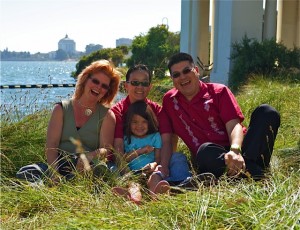“And that it's also possible to build families in an intentional way,” Maya says. “It wasn’t exactly like replicating the nuclear family. It was really more creating an extended family.”
That’s exactly what Maya did about 20 years later, with her transgender partner MeiBeck Scott-Chung.
On a recent visit to their Oakland home, Maya and MeiBeck are helping their eight year-old daughter Luna Lee Yulien Gillingham Scott-Chung with her math homework. Luna's name reflects the Irish, Scottish, Chinese and Hispanic heritages of Maya and MeiBeck, and their friend Daniel Bao. Bao donated his sperm to help conceive Luna.
“He would just basically bring the sperm sample to our house,” Maya says. “Then MeiBeck inseminated me just with a syringe at home.”
MeiBeck remembers the day Luna was born.
“I had [Luna] in my hands,” MeiBeck says. “She was on her back and she opened up her eyes and looked right into my eyes. It was just, wow.”
Maya and MeiBeck always knew they wanted more than one child. Three years ago, they began trying again with Daniel Bao’s sperm. He'd become like family. But they had trouble conceiving. Maya was 42 years old then. They thought a doctor could help inseminate Maya with Daniel’s sperm through a process known as intrauterine insemination.
“That’s when we started to really encounter barriers,” Maya says.
Doctors told Maya and MeiBeck that they could not inseminate Maya with Daniel’s unfrozen sperm because federal law requires Maya and Daniel to be "sexually intimate partners." Daniel’s sperm would need to be treated like it was from a sperm bank and go through extensive testing, be frozen, and then quarantined for six months.
“That process cost four or five thousand dollars,” Maya says. “We would also have to wait six months until we were able to use the sperm and I was 42, so waiting six months was actually a big deal.”
Starting in January, a new state law takes effect and it could make a difference for people trying to access fertility services. The new law expands California's interpretation of “sexually intimate partner” to include both known sperm donors and a donor whose sperm a recipient has already been exposed to through a non-medical attempt to conceive.
San Francisco Bay Area Assemblywoman Nancy Skinner authored the legislation, AB 2356. Skinner says the law also helps single women, lower income women, or heterosexual couples who need help conceiving and want to use the sperm of someone they know.
“There were some colleagues who were afraid [to vote] on a ‘gay rights issue.’” Skinner says. “Well, this affects everyone. And yes, it's very much beneficial to the LGBT community, but it affects everyone.”
Other than a handful of lawmakers and the California Right to Life Committee -- which called the measure bad public policy that could harm women -- Skinner's bill had little organized opposition. Skinner suspects that's because it makes a relatively small change to existing law.
“When I look at a lot of my legislative success, much of it has been little teeny changes that for the people affected make just worlds of difference,” Skinner says.
But the passage of AB 2356 comes too late for Maya and MeiBeck Scott-Chung.
“It doesn't help us because I'm 46 now,” Maya says. “It's extremely unlikely that we would be successful in having children right now, so we are not going to be utilizing this option for our own family building at this point.”
That didn't stop the Scott-Chung's from helping to get the bill passed; telling their story to legislators and writing letters of support.
“We know several dozen people who literally are waiting for that moment to be able to walk in the door and access care,” Maya says.
Moreover, Maya says, the law legitimizes one way the LGBT community builds families.
“I think that the fact that this bill went through with as much support and as little opposition says something about the shifting perception of who is a family,” Maya says. “Certainly we're ready for it because we've been here all along.”
